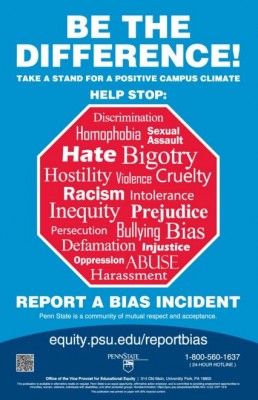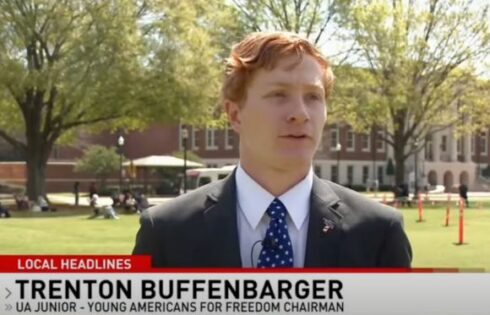
At Pennsylvania State University, no hurt feeling is too small, no slight too inconsequential, no unintentionally biased statement too unimportant.
Administrators want to know it all.
The public university is in the midst of a massive campaign that encourages students not only to watch what they say, lest they offend someone, but also to report any and all biased statements to campus officials.
“There is no place for hate, overt or subtle, at Penn State – such actions do not represent our mutually held values,” Eric Barron, president of Penn State, stated in a recent message to the campus community.
RELATED: College students told to report ‘hurtful statements’ to campus authorities
As a part of the campaign, the university is using posters and magnets to emphasize its Report Bias system set up under the Office of the Vice Provost for Educational Equity.
 More than 1,000 images of a stop sign in the form of posters and magnets have been distributed at Penn State. They tell students to “be the difference” and “take a stand for a positive campus climate.” The posters classify a wide array of situations as a “bias incident” including cases of discrimination, bigotry, inequity, sexual assault, injustice, and much more.
More than 1,000 images of a stop sign in the form of posters and magnets have been distributed at Penn State. They tell students to “be the difference” and “take a stand for a positive campus climate.” The posters classify a wide array of situations as a “bias incident” including cases of discrimination, bigotry, inequity, sexual assault, injustice, and much more.
Barron, in his message to the campus, stated that students should report acts of “hate or intolerance.”
Lisa Powers, director of Penn State’s strategic communications office, said in an email to The College Fix that an act of intolerance includes microaggressions.
“An act of intolerance can be identified as any forms of microaggressions, verbal assaults, and/or racial subjugation,” Powers said.
Powers said the bias reporting acts as a catharsis of sorts for students, acknowledging the public university has no right to hinder students’ First Amendment rights.
“Penn State stands firmly behind free speech and free expression, even in those instances when the views being expressed are disturbing or insulting, or the actions hurtful,” Powers told The College Fix. “The First Amendment doesn’t just apply to those who express ideas with which we agree. It also applies to those whose ideas we may find challenging, repugnant or even appalling. By providing an outlet for individuals to report bias they have seen or experienced, we are giving them an equal right to express their thoughts and feelings on the matter.”
RELATED: Public university spends $16K on campaign to warn students to watch what they say
Like The College Fix on Facebook / Follow us on Twitter
IMAGE: Shutterstock






Please join the conversation about our stories on Facebook, Twitter, Instagram, Reddit, MeWe, Rumble, Gab, Minds and Gettr.